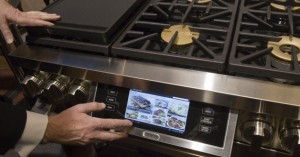
Running out of coffee or razors can be frustrating. Throwing away expired medicines and food too. Managing inventory of all kinds even in the smallest of households is an art perfected by few. Monthly subscriptions for deliveries on a regular basis offer some support. With 5 billion connected “things” in 2015 there should however be better solutions to make empty stocks and out of date products a thing of the past.
Today’s internet connects the world: buyers with sellers, smart devices like tablets and phones with the mushrooming online shops. At the same time, household appliances are becoming increasingly connected and more and more equipped with sensors to provide a broad range of information to users and other parties. For example, a prototype of a smart reusable milk cap that uses sensors to detect when milk starts to go bad was recently created by researchers at the University of California-Berkeley.
Meanwhile, wouldn’t it be great if sensors and smart appliances helped us replenish our groceries? This is not as far-fetched as it seems.
One important step towards auto-replenishment is Amazon’s Dash Button, launched on April 1 2015. Once pushed, the ‘Button’ – attached to appliances around the home – processes automatic refill orders and delivery requests. Each time the button is pressed, an alert is sent to the mobile phone connected to the account and, once the order is approved, detergents, coffee filters and other essential articles are soon after delivered to our home – some even within the hour.
More importantly, alongside the Button, the Dash Direct Replenishing System was launched as well. This service provides an API (Application Program Interface) – a specification which allows smart devices to communicate with each other. The API enables manufacturers to directly integrate the Dash system into appliances – bypassing the Button. Without any action on your part, your espresso machine might soon know when and where to place the order when the stock is low. No more frustrations, no more time to waste for writing the purchasing list for our day-to-day products.
The replenishment services are not only for our homes. Any business and organization can benefit from this development and companies can design new offerings. Xerox, for example, has identified that the most common reason people can’t print is that the printer has run out of toner. Therefore the company has launched an auto supplies replenishment service for printers.
This all is probably only the beginning of a massive development of new services driven by connected devices and the capabilities offered by the internet. What if household appliances not only booked the orders for their refills but also the spare parts in the case of a breakdown and also notified the nearest repairman too?
Of course, everything connected to the internet can be hacked. After two hackers were able to take control of a Jeep over the internet, 1.4 million vehicles needed to be recalled. In the hyper-connected world our security is at stake, both at home and in the workplace. The risk lies not only in the possibility that hackers take control of devices but also in the data gathered by the devices – may it be sensitive personal information or, for example, the secret research data of a company.
The route towards tomorrow’s world of increased convenience and efficiency needs to be explored and with the respective precautions to be taken, not only by individuals but also companies, in particular the manufacturers of the smart devices.
What will the future of the highly connected world look like? Will we see bright and colourful branded buttons on appliances everywhere in our homes, companies and other organisations? Probably not. The likely mainstream scenario is the gradual increase of the number of connected “things” controlled by smartphones, tablets, and wearables acting more and more autonomously. The Apple HomeKit is an indication of the type of frameworks required to control this connected world of partially autonomous appliances and, moreover, the Kit might be one of tomorrow’s most stylish housekeepers.
This blog was originally posted on the World Economic Forum Agenda.
Author: Wolfgang Lehmacher is Director, Head of Supply Chain and Transport, Mobility Industries at the World Economic Forum.
Image: An internet-enabled Dacor Discovery gas range and electric oven is pictured during the 2015 International Consumer Electronics Show (CES) in Las Vegas, Nevada January 4, 2015. REUTERS/Steve Marcus


Leave a Reply